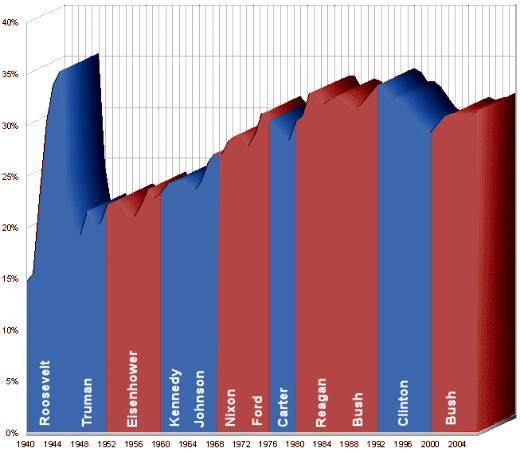
Total Government Spending [1940-2007]
In the last several posts, I’ve been exploring the Republican Talking Point that Democrats are the "tax and spend" party. In war on Talking Points…, I concluded that the "spend" charge is false. Looking at this graph of total spending plotted as % of the Gross Domestic Product, it’s apparent that in the both parties have participated in the escalating spending. In fact, the only exceptions are the Democrats – Bill Clinton and to a lesser extent, Jimmy Carter. Another related Republican Talking Point is "big government." Looking at the graph, one can hardly argue that government isn’t expanding, at least in terms of costs. But again, it doesn’t look like it’s a partisan issue. Both parties seem to be equal opportunity spenders. And when Clinton actually reversed the trend, the Bush Administration pointed us back upwards.
When it comes to taxation, things are a bit more difficult to pin down in the pre-Reagan period. In Mr. Hypothetical goes to Washington…, I tried to look at the partisan question. Once FDR put the graduated Income Tax in place weighted heavily towards the wealthy, the only pre-Reagan President to make much of a change was Lyndon Johnson when he assumed the remainder of Kennedy’s term. Neither Eisenhower, Nixon, or Ford did anything to change it. The Democrats’ reputation as heavy taxers seems primarily based on FDR’s New Deal taxation scheme in the face of the Great Depression and World WarII.
-
1979 – the Tax Structure from 1964 through 1979 [Johnson, Nixon, Ford, Carter]
-
1987 – Regan changed things gradually.This one is where he ended up
-
1992 – George H.W. Bush continued the cutting
-
1996 – Clinton’s Revisions
-
2005 – George W. Bush’s tax cuts
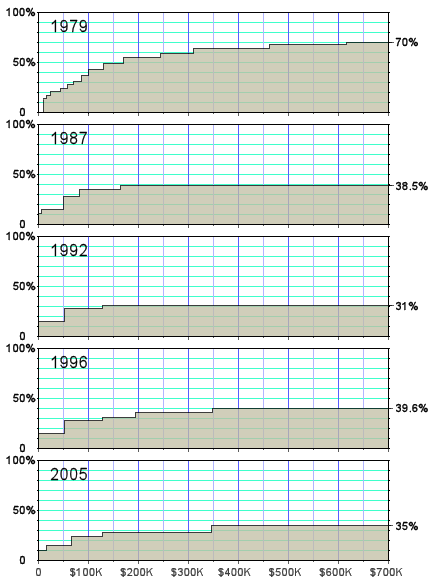
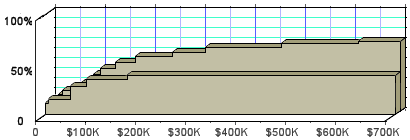
The 1979 and 1987 Tax Structures compared
While I don’t agree that the tax structure in 1979 was totally from the Democrats, I do agree that it was in need of revision. Even though the wealthy have plenty of money, it seems unreasonable to tax anyone at 70%. But Reagan’s Tax Reform erred way in the other direction. It was a massive intervention. He returned us to the days of Calvin Coolidge [when Ronnie was just a lad]. Like most of Reagan’s changes – tax reform, deregulation, the banks – he seemed determined to undo FDR’s New Deal from 45 years before. And that’s exactly what he did.
No wonder he is reverred by the wealthy. The top end wage earners doubled their take home pay under Reagan [30% tp 61.5%]. And as many of us have demonstrated, the wealthy have prospered greatly thereafter [unlike the rest of us who have stayed the same]. Remember "trickle down economics" from the Reagan era? Somehow these massive tax cuts for the wealthy were supposed to help everyone because their prosperity would … well, it would just trickle down. It looks more like money trickled up to me [or maybe we got tinkled on, to paraphrase Carl’s comment].
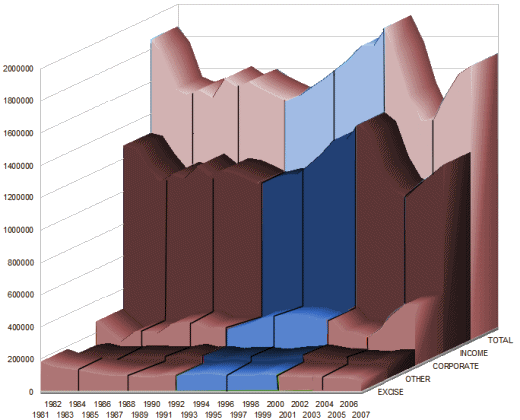
Revenue floundered, as one might have expected [shown here corrected to 2007 dollars]. And Reagan continued to spend, resulting in record-breaking deficits. In the end, it wasn’t really a tax cut at all. It was a give-away because the lost revenue was simply rolled into the National Debt. He might as well have declared it a war on taxes, because he ran up the debt in the wartime way:
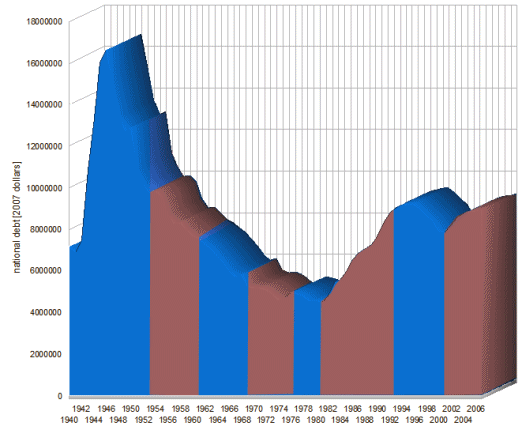
Clinton dealt with the Reagan Tax Reform in a politically sensible way. He simply added two modest Tax Brackets on top of Reagan’s structure, and he cut spending dramatically. As a result, we pulled into the black briefly, until George Junior reversed both processes [increased spending and decreased revenue] putting us solidly back in the red [Note: These graphs leave off the financial disaster a year ago for clarity, but the national debt soared with the bank bailout].
Addendum: And what did Reagan spend our money on? A lot of it was "wartime" spending for the war that wasn’t [the darker graph is military spending]…
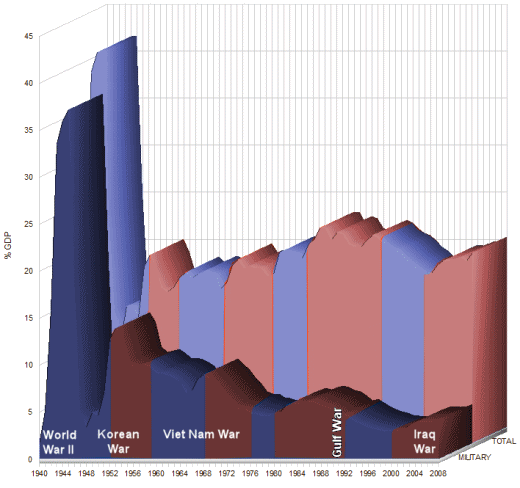
This is f….n brilliant!! Putting aside the graphological technical prowess…just understanding which data and compiling them for the purpose of illustration wreaks havoc with the idea that IQ declines over time.
It is absolutely brilliant! But you should have seen him when he was younger.